Gardening tools do more than just help you tend plants—they’re gateways to mental wellness. When you use ergonomic tools, you reduce physical strain, allowing your mind to focus on the meditative aspects of gardening. Tactile experiences with textured handles ground you in the present moment, while repetitive motions trigger serotonin release, improving your mood. Adaptive equipment makes these benefits accessible to everyone regardless of physical ability. The right tools transform simple gardening into powerful therapy for your mind.
How Gardening Tools Boost Mental Wellness
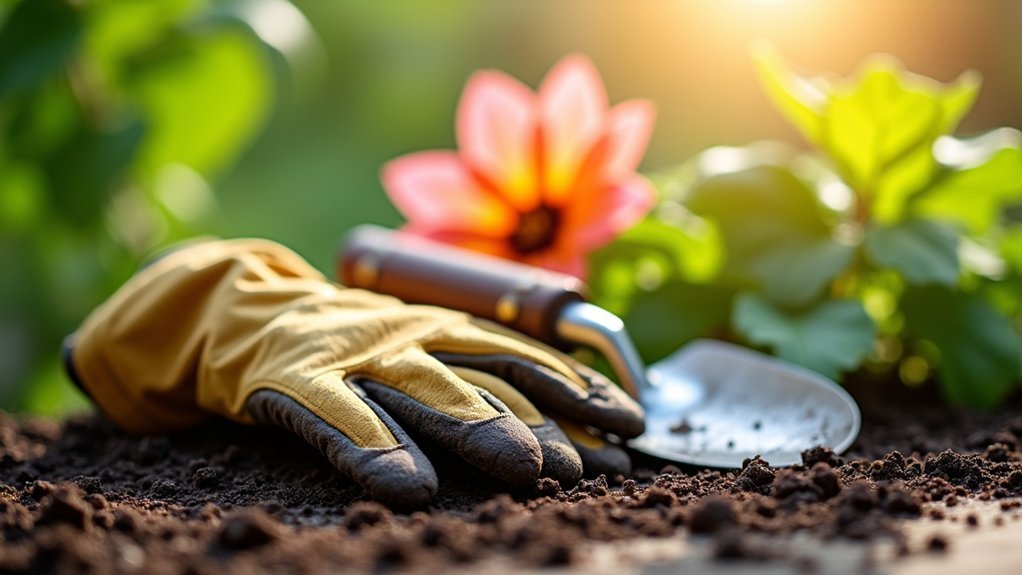
While many people view gardening tools simply as implements for digging and pruning, they actually serve as gateways to profound mental health benefits. When you grasp a trowel or pruner, you’re not just preparing to work with plants—you’re engaging in tactile experiences that ground you in the present moment.
These tools facilitate the physical activity that boosts your overall fitness and triggers the release of mood-enhancing endorphins. The repetitive motions of digging, raking, or weeding become meditative practices, reducing stress and anxiety. Ergonomic gardening tools can provide cognitive stimulation as seniors learn to adapt their techniques and approaches to plant care.
Your garden tools can be customized to accommodate physical limitations, making the mental wellness benefits of gardening accessible regardless of your abilities. Even the simplest watering can becomes an instrument of mindfulness, connecting you to nature’s therapeutic rhythm.
The Mind-Body Connection of Ergonomic Garden Tools
Ergonomic garden tools represent far more than mere physical conveniences—they embody the essential bridge between bodily comfort and mental wellbeing. When you’re using tools designed to fit your body, you’ll experience reduced strain, allowing your mind to focus on the meditative aspects of gardening rather than physical discomfort. Proper tools help prevent gardening from being abandoned due to perceived difficulties, especially among those with temporary or permanent disabilities.
| Mental Benefit | Physical Connection |
|---|---|
| Mindfulness | Reduced joint strain |
| Stress reduction | Improved posture |
| Enhanced satisfaction | Decreased muscle fatigue |
| Increased confidence | Better coordination |
This mind-body harmony fosters a deeper connection with nature as you work. The physical ease provided by ergonomic tools transforms gardening from potentially strenuous labor into a form of moving meditation, where your improved physical comfort directly translates to mental clarity and emotional well-being.
Adaptive Equipment That Removes Barriers to Nature Therapy
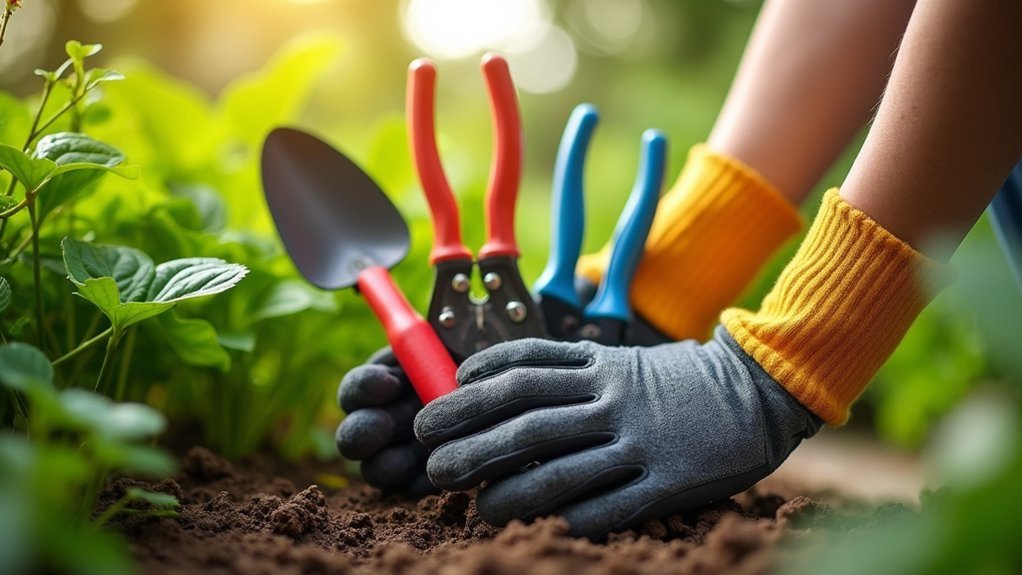
For individuals with physical limitations or disabilities, adaptive gardening equipment opens doorways to the therapeutic world of nature that might otherwise remain closed. Raised beds eliminate bending while wheelchair-accessible designs feature wider paths and appropriate work heights.
Adaptive gardening breaks physical barriers, inviting everyone to experience nature’s healing touch through thoughtful design.
You’ll find tools designed with your specific needs in mind—enlarged padded handles for arthritic hands, lightweight materials to reduce fatigue, and long-handled options to protect your back.
Color-coded and textured grips help those with visual or sensory impairments navigate their toolkit confidently.
These adaptations do more than enable physical gardening—they nurture psychological wellness. When you can garden independently, you’ll experience reduced anxiety, heightened self-esteem, and the profound mood-enhancing benefits of connecting with nature, regardless of mobility or dexterity challenges. Resources from NCHPAD Connect provide free online access to information about these wellness-enhancing tools and techniques.
Sensory Garden Tools for Anxiety and Stress Reduction
Textured garden tools with specialty grips can stimulate your tactile senses while reducing stress through mindful engagement with nature.
You’ll find that aromatic pruners, infused with calming essential oils like lavender, offer dual benefits of practical gardening and aromatherapy to lower cortisol levels.
Weighted trowels provide the grounding effect many anxiety sufferers need, as the added resistance creates body awareness and promotes the serotonin boost that gardening naturally encourages. These specialized tools promote biophilic principles that strengthen our innate connection to the natural world while supporting emotional resilience.
Textured Tools Engage Senses
When seeking relief from anxiety and stress, the sensory engagement offered by specially designed garden tools can provide significant benefits.
Textured tools create a multi-sensory experience that grounds you in the present moment, interrupting anxious thought patterns. These tools are particularly effective because they engage multiple senses simultaneously, compensating for limited sensory input and enhancing your overall perception of the environment.
- Grip a wooden-handled rake with natural grain patterns that warm to your touch
- Feel the contrast between smooth metal trowels and their textured rubber grips
- Experience the satisfying resistance as a serrated pruner cuts through stems
- Run your fingers along the bristles of different garden brushes
- Notice how each tool creates unique sounds—the gentle scrape of a hoe or the soft thud of a hand tiller
These varied tactile experiences stimulate your senses, improving hand-eye coordination while creating a calming environment that reduces stress hormones naturally.
Aromatic Pruners Calm Minds
Breathing in the subtle scents of nature while you work in the garden creates a powerful calming effect, and aromatic pruners amplify this benefit through intentional design.
These tools release compounds that directly influence your brain’s emotional centers, reducing cortisol levels and regulating your stress response.
When you use lavender-infused pruners, you’re engaging your limbic system—the brain’s emotional command center—which processes scent signals to promote relaxation.
Citrus-scented tools boost your mood, while rosemary enhances mental clarity during detailed pruning tasks.
The combination of tactile engagement and aromatherapy creates a multi-sensory experience that grounds you in the present moment. This mindful connection with plants through specialized tools can significantly contribute to improved cognitive function in urban environments where green space access is limited.
Your brain gradually forms positive associations between gardening activities and relaxation, making these aromatic tools particularly valuable for therapeutic gardening practices.
Weighted Trowels Ground Emotions
Weighted trowels offer a uniquely tactile approach to emotional regulation while gardening, complementing the aromatic benefits of scented pruners with physical grounding techniques.
These specially designed tools provide deep pressure stimulation similar to weighted blankets, helping to calm your nervous system as you work with soil.
When anxiety threatens to overwhelm your thoughts, weighted garden tools can bring you back to the present moment through:
- The satisfying heft of the tool pressing into rich soil with each scoop
- The balanced weight distribution creating a calming pressure on your palm
- The enhanced tactile feedback connecting you to the earth’s stability
- The rhythmic motion of digging creating a meditative physical routine
- The grounding sensation of pressure reducing mental chatter
Research indicates that tools utilizing deep pressure stimulation may activate the parasympathetic nervous system, reducing heart rate and anxiety while you garden.
Raised Bed Systems: Accessibility and Mental Health Benefits
Raised bed systems dramatically reduce physical strain on your body, allowing you to garden longer with less pain and greater enjoyment.
You’ll find these accessible designs create inclusive therapeutic spaces where anyone, regardless of mobility challenges, can experience the mental health benefits of gardening.
These ergonomic gardening solutions transform what might otherwise be a physically stressful activity into a comfortable, mentally restorative practice that supports your overall wellbeing.
The thoughtful implementation of universal design principles ensures raised garden beds eliminate the need for kneeling or bending, making gardening accessible and enjoyable for everyone.
Ergonomic Stress Reduction
While many gardeners struggle with physical discomfort, ergonomically designed raised bed systems offer a practical solution that simultaneously enhances mental wellness.
You’ll experience significant stress reduction when your garden is designed with your body in mind.
- Customized bed heights eliminate back strain, allowing you to garden without pain
- Wheelchair-accessible designs enable gardening from a seated position with comfort
- Strategically placed bench seating provides rest areas when fatigue sets in
- Wide, level pathways reduce navigation anxiety and prevent trips or falls
- Ergonomic tools complement raised beds, further reducing physical demands
This thoughtful approach to gardening doesn’t just make the activity possible—it transforms it into a genuinely therapeutic experience. Recommended dimensions of 3-4 feet wide ensure you can reach plants from either side without straining.
When your body isn’t fighting discomfort, your mind can fully engage with the restorative aspects of nurturing plants.
Inclusive Therapeutic Spaces
Creating inclusive therapeutic spaces fundamentally transforms the gardening experience for individuals with diverse physical abilities and mental health needs.
Raised bed systems, designed at various heights with proper knee clearance, eliminate the need to bend or kneel while providing easy reach to plants and tools.
These accessible gardens offer significant mental health benefits beyond physical accommodation. You’ll experience reduced stress and improved mood while working in these thoughtfully designed spaces. The sense of accomplishment and connection to nature enhances your emotional resilience and cognitive function.
Community integration amplifies these benefits, as accessible gardens foster social interaction and knowledge sharing. With pathways at least 4 feet wide, firm non-slip surfaces, and strategically placed seating areas, you can comfortably enjoy the therapeutic benefits of gardening while resting when needed.
Therapeutic Benefits of Specialized Hand Tools for Limited Mobility
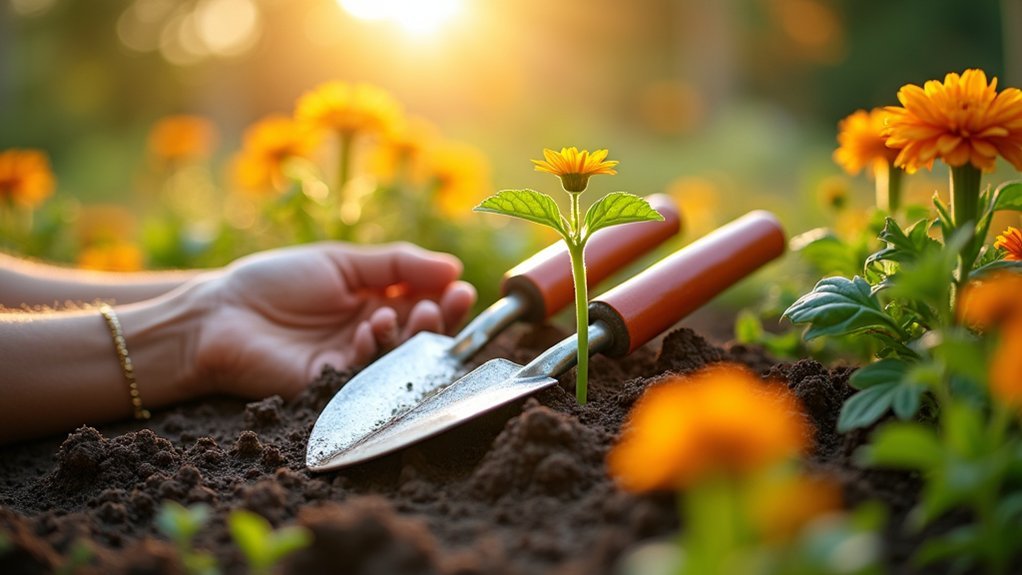
For individuals with limited mobility, specialized gardening hand tools offer far more than just practical assistance—they provide a gateway to therapeutic wellness.
Using ergonomically designed tools with adaptive handles helps you build muscle strength, improve joint flexibility, and enhance circulation while reducing strain on your hands and wrists.
Embrace gardening’s healing touch with tools designed to strengthen muscles and protect joints during every dig, prune and plant.
These tools transform gardening into a therapeutic experience by:
- Reducing frustration and fostering a sense of independence as you cultivate plants without assistance
- Creating opportunities for mindfulness as your hands connect with soil and plants
- Boosting your self-esteem when you successfully complete gardening tasks
- Minimizing pain through proper tool design that prevents awkward postures
- Building fine motor skills that transfer to other daily activities
Engaging with these specialized tools creates a natural form of stress reduction as gardening activities help lower cortisol levels and promote mental equilibrium.
How Lightweight and Extended-Reach Tools Foster Independence and Confidence
Lightweight and extended-reach gardening tools offer transformative benefits that extend well beyond simple convenience for those with mobility challenges. You’ll experience newfound independence as these ergonomic tools allow you to maintain larger garden spaces without assistance, reducing strain while promoting better posture. These tools provide engaging activities that can help reduce stress and anxiety through the repetitive and focused nature of gardening tasks.
| Tool Type | Independence Benefit | Confidence Boost |
|---|---|---|
| Telescopic Pruners | Reach high branches without ladders | Master difficult pruning tasks |
| Lightweight Trowels | Reduce wrist fatigue during planting | Complete more beds without help |
| Long-handled Weeders | Eliminate kneeling or bending | Maintain weed-free spaces independently |
| Ergonomic Watering Wands | Water hard-to-reach planters | Create thriving displays in previously inaccessible areas |
Using these specialized tools consistently builds your gardening skills while fostering resilience and creativity in overcoming obstacles—transforming gardening from a challenge into a rewarding journey of personal growth.
Garden Planning Aids: Structuring Activity for Cognitive Health
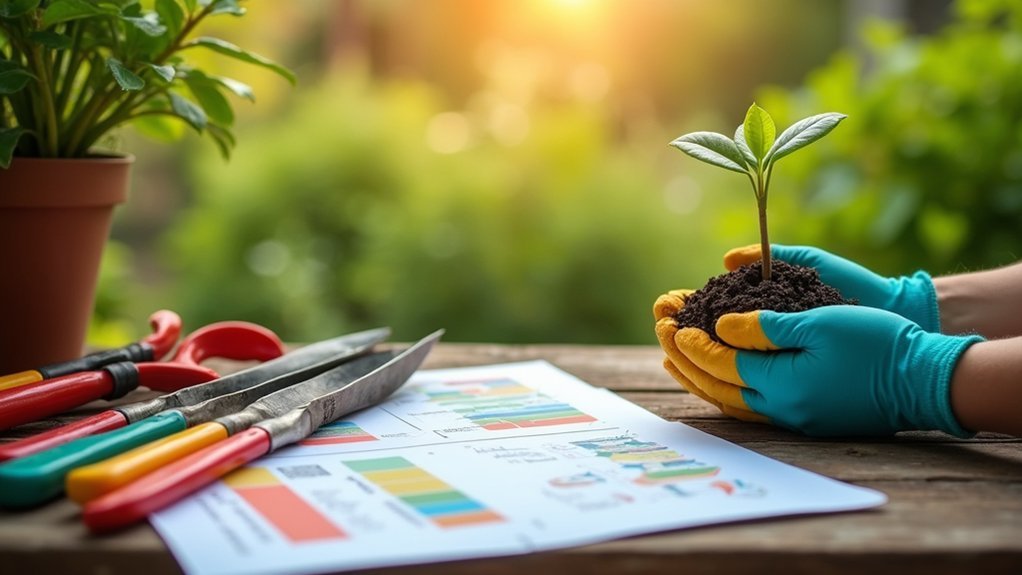
Garden planning tools offer significant cognitive benefits that enhance your mental wellness journey.
Design apps can reduce anxiety by visualizing outcomes before you commit to physical changes, while planning journals strengthen memory through consistent documentation of garden development.
Layout grids improve your focus by providing structured frameworks that organize thoughts and plant placement strategies. These planning activities offer attention restoration benefits through immersion in natural settings, even during the preparatory phases of gardening.
Design Apps Reduce Anxiety
Modern gardening apps serve as powerful tools for reducing anxiety while enhancing cognitive health. These digital assistants transform chaotic garden planning into structured, manageable activities that provide both purpose and control.
When you use garden design apps, you’ll experience:
- Mindful focus as you drag and position virtual plants, drawing attention away from anxious thoughts
- Creative expression through designing layouts that reflect your personal style and vision
- Satisfaction from seeing your garden materialize in 3D visualizations before planting a single seed
- Connection with like-minded gardeners through community features, reducing isolation
- Confidence through learning new skills and creating successful planting schedules
The structured goal-setting and visual planning features help manage overwhelm, while the cognitive stimulation improves mental acuity and problem-solving skills. This technology particularly benefits those seeking to maintain mental wellness during periods of isolation, as observed during the pandemic.
Planning Journals Enhance Memory
While digital apps offer innovative planning solutions, physical garden journals provide tangible benefits for memory enhancement. By recording your planting dates, observations, and maintenance schedules, you’re engaging multiple cognitive processes simultaneously, reinforcing neural pathways.
The structured approach of journaling helps you organize gardening activities, improving your memory recall and attentional control. As you consistently plan and document your garden’s progress, you’re creating cognitive routines that enhance organizational skills and memory retention. This structured activity can help reduce cognitive decline, as studies indicate gardening activities trigger neurogenesis and support brain health maintenance.
Research shows this structured planning approach increases brain-derived neurotrophic factor (BDNF) levels, supporting neural growth and cognitive flexibility.
Your journal becomes a powerful tool for reflecting on past experiences, tracking progress, and anticipating future tasks—all activities that strengthen memory performance and cognitive resilience as you age.
Layout Grids Improve Focus
When you work with layout grids for garden planning, you’re engaging in a cognitive exercise that sharpens focus and mental organization.
These structured frameworks reduce cognitive overload by breaking complex designs into manageable units, allowing your brain to process spatial information more efficiently.
Layout grids activate your executive function skills while promoting stress reduction:
- Your prefrontal cortex engages as you solve spatial puzzles within defined grid spaces
- Working memory strengthens as you visualize plant placements across interconnected sections
- Decision fatigue decreases with clear boundaries limiting your choices
- Soft fascination occurs as you effortlessly focus on the grid-guided planning task
- Brain-derived neurotrophic factor increases through the combined mental and physical activity
This type of gardening activity could be particularly beneficial for individuals experiencing cognitive impairment related to cancer treatment and chemotherapy.
This structured approach doesn’t just organize your garden—it organizes your thoughts, restoring mental clarity while building cognitive resilience.
Container Gardening Equipment for Mindfulness Practice in Small Spaces
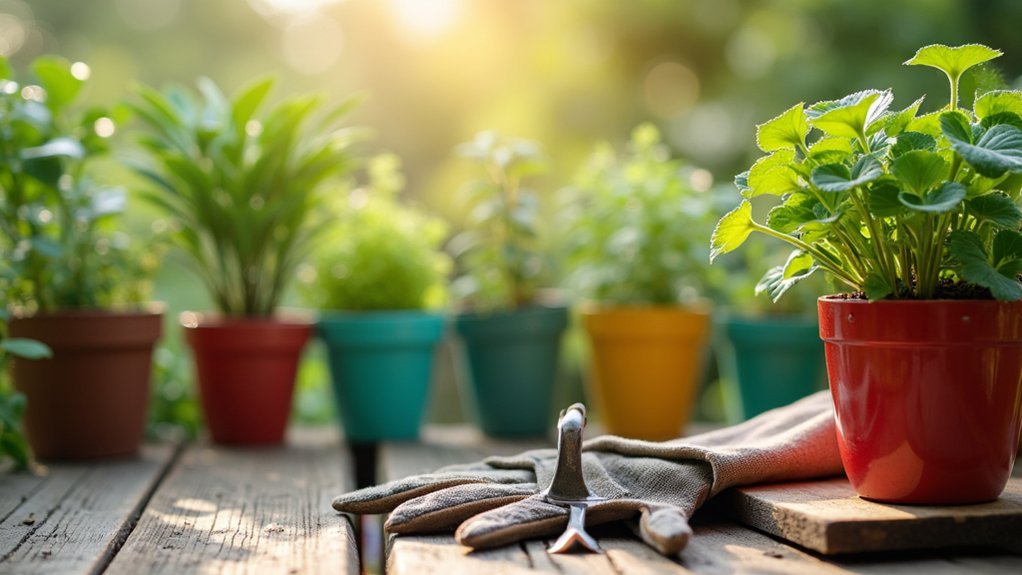
For those living in apartments or homes with limited outdoor access, container gardening equipment offers a gateway to mindfulness practice that doesn’t require sprawling garden beds.
Compact tools with ergonomic handles reduce strain while enabling precise, focused tasks that anchor you in the present moment.
Self-watering containers minimize maintenance distractions, allowing you to immerse fully in the sensory experience. The repetitive motions of gently working soil with textured gloves enhance tactile connection, triggering mood-boosting serotonin release.
Portable moisture meters provide immediate feedback, deepening your awareness of plant needs.
You’ll find these accessible tools adapt to various physical abilities and schedules, making mindfulness achievable regardless of space constraints.
The combination of sensory engagement and focused activity measurably reduces anxiety while improving overall well-being. These mindful gardening techniques can decrease stress levels significantly while fostering a deeper appreciation for nature in urban environments.
Weather-Resistant Tools That Encourage Year-Round Mental Wellness
The durability of weather-resistant gardening tools extends beyond mere functionality, transforming into a year-round mental wellness partner that won’t abandon you when seasons change.
These reliable companions—crafted from stainless steel, aluminum, and fiberglass—enable consistent engagement with nature’s therapeutic benefits regardless of weather conditions.
Your mental health flourishes through this uninterrupted connection with gardening:
- Stainless steel trowels glinting in winter sunshine as you tend to cold frames
- Aluminum rakes with comfortable grips moving autumn leaves while rainfall patters around you
- Pruners with rubber handles snipping summer growth during humid mornings
- Fiberglass-handled spades turning spring soil after snow melts
- Plastic-coated wire supports standing firm against wind while you mindfully attach climbing plants
This consistency in gardening practice maintains your therapeutic relationship with nature across all seasons. Adaptive tools with ergonomic designs allow gardeners with limited mobility to experience the stress-reducing benefits of garden therapy without physical strain.
Multi-Purpose Gardening Aids for Social Gardening Experiences
Multi-purpose gardening tools transform solitary planting sessions into vibrant social experiences, creating opportunities for connection while nurturing both plants and relationships.
Trowels and hand forks enable collaborative planting and soil cultivation without crowding, while secateurs facilitate group pruning workshops where skills are shared.
When you join community gardens, ergonomic tools reduce physical strain, allowing for longer, more engaging sessions with fellow gardeners.
Wheelbarrows streamline cooperative efforts as you transport materials together, fostering teamwork and efficiency.
Pushing together, we haul mulch and seedlings—building gardens and friendships with every load.
These shared tools do more than simplify gardening tasks—they build community.
The back-and-forth rhythm of hoeing alongside others reduces stress while enhancing group cohesion.
The Hori Hori Knife’s versatility makes it perfect for group gardening activities where participants can use its serrated edge for various tasks from harvesting to dividing perennials.
Through tool-sharing programs, you’ll develop routine social connections and a sense of belonging that greatly contributes to your psychological wellbeing.
Frequently Asked Questions
How Do Gardening Tools Specifically Impact Clinical Depression Symptoms?
Gardening tools help reduce your clinical depression symptoms through physical activity that lowers cortisol levels. They’re especially effective in horticultural therapy settings where you’ll engage in structured, purposeful activities for 4-8 weeks.
Can Children With ADHD Benefit From Specialized Gardening Equipment?
Yes, your child with ADHD can benefit greatly from specialized gardening tools. They’ll experience improved focus, sensory engagement, and a sense of accomplishment while developing responsibility through equipment designed specifically for their needs.
Are There Gardening Tools Designed Specifically for Dementia Patients?
Yes, you’ll find tools with ergonomic handles, simplified designs, and enhanced safety features specifically made for dementia patients. These adaptive gardening tools improve grip, reduce frustration, and help increase engagement during gardening activities.
How Do Digital Gardening Tools Compare to Traditional Ones for Anxiety Reduction?
Digital gardening tools offer convenience and accessibility through planning apps and online communities, but you’ll get more anxiety-reducing benefits from traditional gardening’s physical activity, sensory experiences, and direct connection with nature.
What Gardening Equipment Works Best for Veterans With PTSD?
You’ll find manual tools like trowels and rakes most beneficial, as they provide tangible connections with nature. Planters, gloves, and simple watering equipment offer manageable control while supporting your therapeutic journey with PTSD.
In Summary
You’ve seen how the right gardening tools can transform your mental health journey. They’re not just implements but gateways to mindfulness, accessibility, and connection with nature. Whether you’re using ergonomic equipment, sensory tools, or planning aids, you’re investing in your wellbeing. By choosing tools that fit your needs, you’ll create a sustainable practice that nurtures both your garden and your mind.

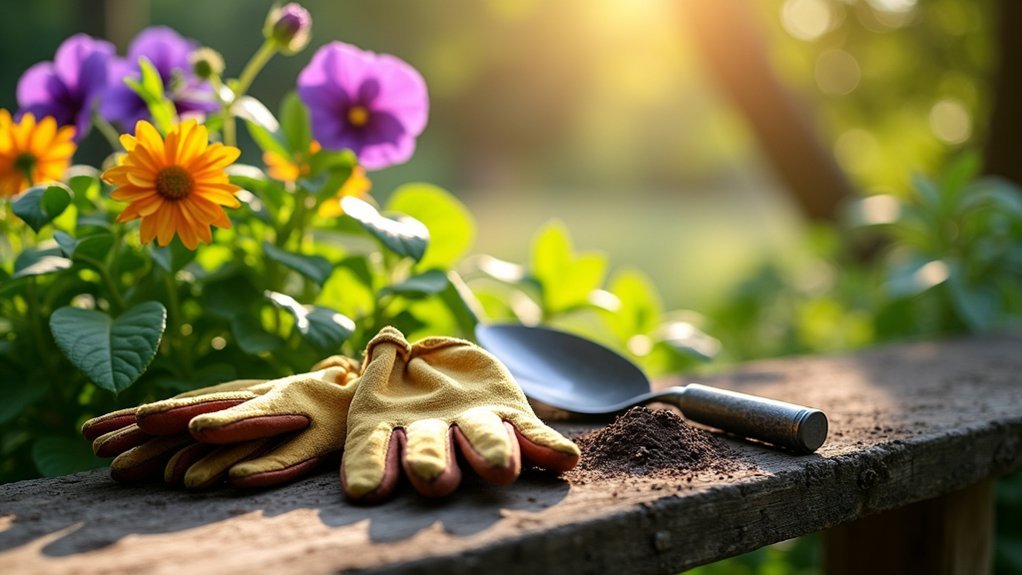
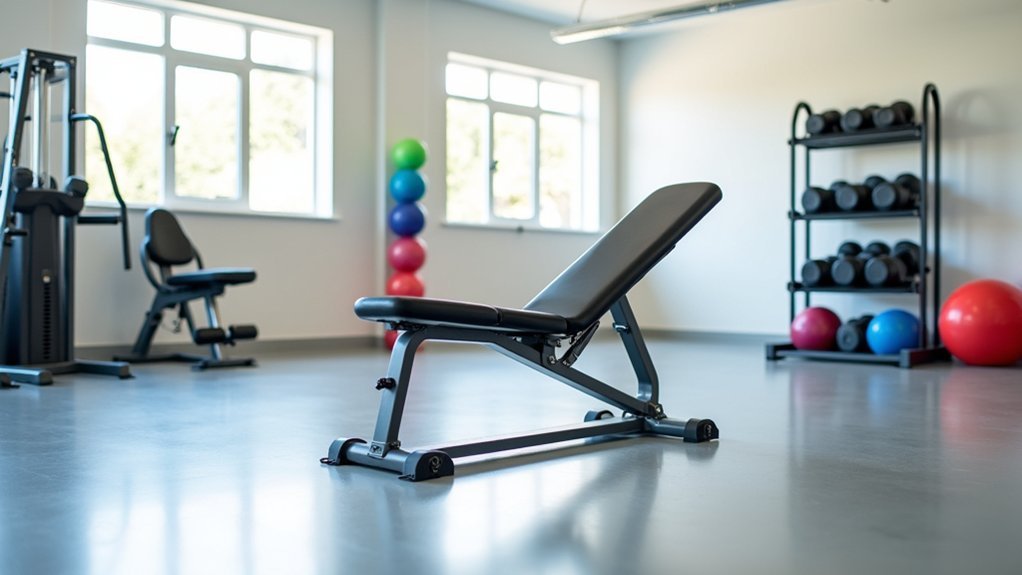
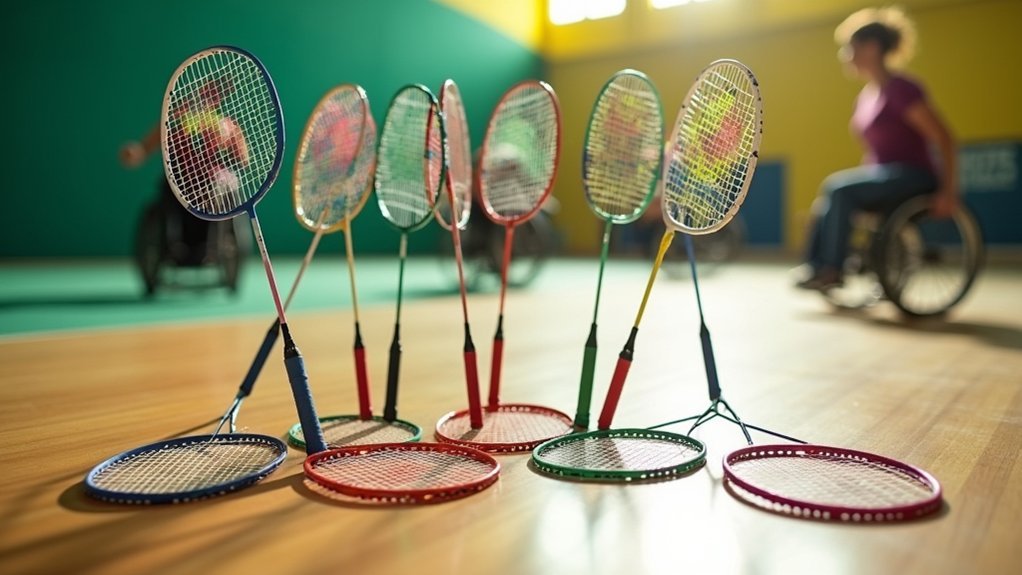

Leave a Reply